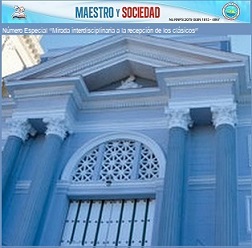Persuasion and rhetorical refutation in the tragedy Prometheus of Héctor Incháustegui Cabral
Array
Keywords:
Prometheus, refutation, persuasion, tragedy, intertextualityAbstract
Since its emergence, rhetoric has been used to articulate the discourse of power and the relationships it establishes when generating consensus or justifying certain policies. However, this discursive phenomenon is not limited only to the social sphere, but also to the literary one, capable of being projected even in the Greek tragedy, where it found a significant foothold. The constant re-elaborations and reappropriations of the classical sources within the Latin American modern theatrical scope were not only limited to specific topics and conflicts, but also to the importance of the word within the scene, evidenced above all in the well-known agon between characters. The present aims to carry out a discursive analysis, taking into account the categories of refutatio and persuasion, in the drama Prometheus, by the Dominican author Héctor Incháustegui Cabral, for the novelty that comes with his treatment in the Spanish-American context of the 20th century.
Downloads
Published
How to Cite
Issue
Section
License
This journal provides immediate open access to its content, based on the principle that offering the public free access to research helps a greater global exchange of knowledge. Each author is responsible for the content of each of their articles.



























 Universidad de Oriente
Universidad de Oriente 